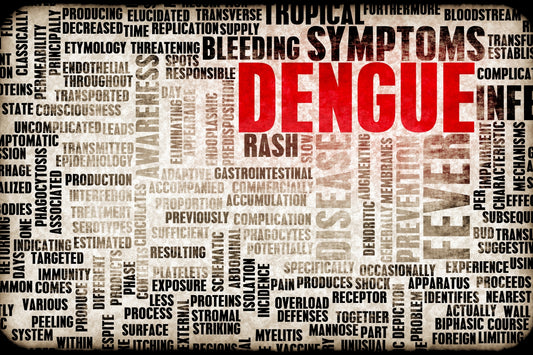Introduction
The Dengue virus is a type of virus that belongs to the Flaviviridae family. It spreads when infected mosquitoes, called Aedes mosquitoes, bite people. Dengue can make people sick in different ways, from not feeling sick at all to getting very ill with Dengue Hemorrhagic Fever or Dengue Shock Syndrome, which can be deadly.
Around 2.5 billion people live in places where they could get Dengue, and about 100 million new cases happen worldwide every year. Recently, more and more people are getting Dengue because there are more people living in places where the virus is common.
Dengue is a complicated problem because it affects our bodies in complex ways, costs a lot of money to deal with, and has consequences for the environment. In India, the first outbreak of a sickness that looked like Dengue was in Madras (which is now called Chennai) in 1780. The first confirmed outbreak of Dengue Fever in India, where they could prove it was caused by the Dengue virus, was in Calcutta (now Kolkata) and along the Eastern Coast of India in 1963-1964.
Dengue Symptoms
-
High Fever: Sudden high fever is one of the hallmark symptoms of dengue. The fever may be as high as 104°F (40°C).
-
Severe Headache: Intense headaches, often described as a "breakbone" or "bone-crushing" headache, are common with dengue.
-
Pain Behind the Eyes: Many people with dengue experience pain and discomfort behind their eyes.
-
Joint and Muscle Pain: Dengue fever is often associated with severe joint and muscle pain, which is why it's sometimes referred to as "breakbone fever."
-
Fatigue: Extreme fatigue and weakness are common, and they can persist for several weeks.
-
Rash: Some individuals with dengue develop a rash, which may appear a few days after the fever begins. It's usually a maculopapular rash, which means it consists of flat, red spots or small raised bumps.
-
Nausea and Vomiting: Nausea and vomiting are common symptoms, which can contribute to dehydration.
-
Mild Bleeding: In some cases, individuals with dengue may experience mild bleeding from the nose or gums. More severe bleeding can occur in severe forms of the disease like Dengue Hemorrhagic Fever (DHF) or Dengue Shock Syndrome (DSS).
-
Abdominal Pain: Pain in the abdominal area, often accompanied by tenderness, can occur.
Dengue treatment
-
Rest: Adequate rest is essential to help the body recover from the infection and combat fatigue.
-
Hydration: Maintaining proper hydration is crucial, as dengue fever can cause significant fluid loss through symptoms like vomiting and fever. Oral rehydration solutions (ORS) or intravenous (IV) fluids may be needed to prevent dehydration.
-
Pain and Fever Management: Over-the-counter pain relievers like acetaminophen (paracetamol) are often used to reduce fever and relieve pain. Avoid using non-steroidal anti-inflammatory drugs (NSAIDs) such as ibuprofen, aspirin, or naproxen, as they can increase the risk of bleeding in dengue cases.
-
Close Monitoring: Patients with dengue should be closely monitored for any signs of worsening symptoms, especially if they develop warning signs of severe dengue. These warning signs include severe abdominal pain, persistent vomiting, rapid breathing, bleeding gums, fatigue, and restlessness. Immediate medical attention is necessary if any of these signs appear.
-
Hospitalization: Severe cases of dengue, such as Dengue Hemorrhagic Fever (DHF) or Dengue Shock Syndrome (DSS), require hospitalization. In the hospital, patients can receive more intensive care, including intravenous fluids, blood transfusions if necessary, and close monitoring of vital signs.
-
Platelet Transfusions: In severe cases where platelet counts drop significantly, platelet transfusions may be required to prevent or manage bleeding.
Vector control
In India, the most common mosquito that carries the Dengue Virus is called Aedes aegypti, and the second most common is Aedes albopictus. Aedes aegypti is mostly found in places near cities, and it's starting to replace Aedes albopictus in some areas. These mosquitoes like to breed in containers that hold water, such as plastic or metal drums and cement tanks. As cities grow, transportation develops, and habitats change, the risk of diseases carried by these mosquitoes also increases.
One way to prevent these diseases is by controlling the mosquito population. However, some mosquitoes have become resistant to certain chemicals used for control, like DDT and dieldrin. But they are still vulnerable to substances like malathion. Temephos is a good chemical for controlling Aedes aegypti, followed by fenthion, malathion, and DDT. Using fogging treatments around homes can reduce the number of mosquitoes for a few days.
There are also plant-based repellents that can help protect against mosquito-borne diseases. Some compounds from the Poncirus trifoliata plant can affect different stages of the Aedes aegypti mosquito's life. Extracts from the Eclipta alba plant (false daisy) have shown potential for killing Aedes aegypti larvae and eggs. Additionally, a substance called hydrophobic nanosilica at a certain concentration can be effective against various mosquito species.
Dengue Q&A
-
Is Dengue Contagious? Dengue is not directly contagious from person to person. It is primarily transmitted through the bite of infected Aedes mosquitoes.
-
How Dengue Is Caused? Dengue is caused by the Dengue virus, which is transmitted to humans through the bites of infected Aedes mosquitoes.
-
How to Prevent Dengue? Dengue prevention involves measures like using mosquito repellent, wearing protective clothing, eliminating mosquito breeding sites (standing water), and using mosquito nets or screens.
-
Is Dengue Dangerous? Yes, Dengue can be dangerous, especially in severe cases. It can lead to Dengue Hemorrhagic Fever (DHF) or Dengue Shock Syndrome (DSS), which can be life-threatening.
-
Is Dengue Curable? There is no specific antiviral cure for dengue. Treatment primarily involves managing symptoms and providing supportive care.
-
Is Dengue a Viral Disease? Yes, Dengue is a viral disease caused by the Dengue virus.
-
Which Mosquito Causes Dengue? The primary mosquito species responsible for transmitting Dengue is Aedes aegypti, followed by Aedes albopictus.
-
Is Dengue an Infectious Disease? Yes, Dengue is an infectious disease, but it is not spread from person to person. It is transmitted through infected mosquito bites.
-
How to Increase Platelets in Dengue? Increasing platelet counts in dengue often involves medical care and monitoring. This may include intravenous fluids and, in severe cases, platelet transfusions.
-
Can Dengue Happen Twice? Yes, it is possible to get dengue more than once. There are four serotypes of the Dengue virus, and previous infection with one serotype does not provide immunity against the others.
-
How Long Does Dengue Fever Last? Dengue fever typically lasts for about 2 to 7 days, but recovery can take several weeks, especially if it's a severe case.
-
How to Prevent Dengue at Home? Preventing dengue at home involves eliminating mosquito breeding sites, using mosquito nets or screens, and using mosquito repellent.
-
How Many Serotypes of Dengue Virus? There are four serotypes (strains) of the Dengue virus, referred to as DEN-1, DEN-2, DEN-3, and DEN-4.
-
Can Dengue Relapse? Dengue can sometimes lead to a relapse of symptoms, known as Dengue Fever with Warning Signs. It's important to seek medical attention if symptoms return.
-
How to Overcome Fatigue After Dengue? Recovery from dengue-related fatigue involves getting plenty of rest, staying hydrated, and gradually increasing physical activity as advised by a healthcare professional.
-
Is There Any Medicine for Dengue? There is no specific antiviral medicine for dengue. Treatment is primarily supportive, focusing on managing symptoms.
-
Is Diarrhea a Symptom of Dengue? Diarrhea is not typically considered a common symptom of dengue. The most common symptoms are fever, severe headache, joint and muscle pain, and rash.
-
Is Dengue Spread by Touch? Dengue is not spread through touch or direct person-to-person contact. It is transmitted through mosquito bites.
-
What Are the Signs of Recovery from Dengue? Signs of recovery from dengue include a decrease in fever, improvement in general well-being, and a gradual return to normal energy levels. Medical advice should be followed for a complete recovery.
-
How Does the Dengue Mosquito Look Like? Aedes mosquitoes, including Aedes aegypti, which can transmit dengue, are typically small, dark-colored mosquitoes with distinctive white markings on their body and legs. They are often recognized by their appearance.




